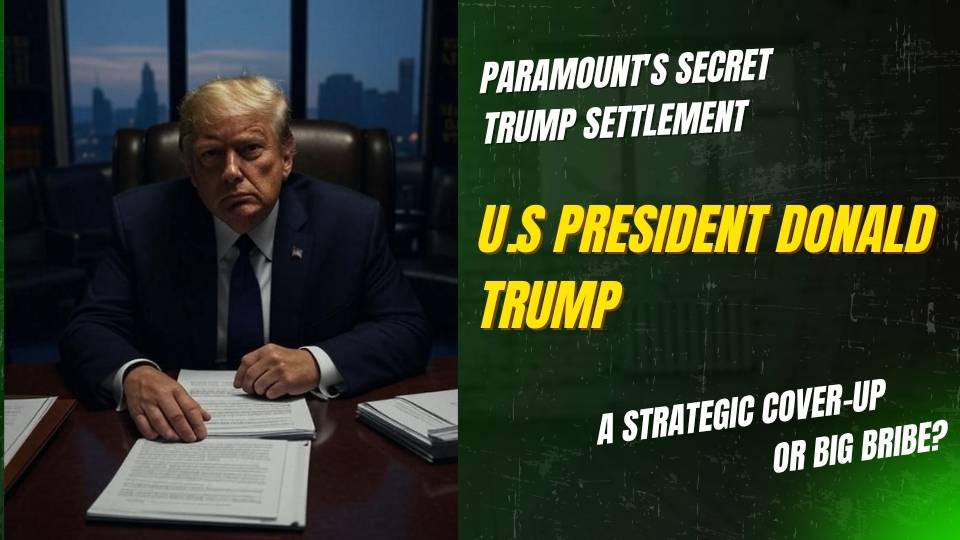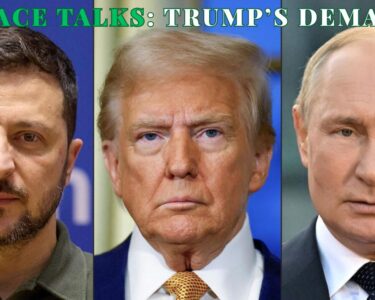In a media world driven by influence, power, and perception, few stories merge entertainment and politics as dramatically as Paramount’s secret settlement with former U.S. President Donald Trump.
Though major headlines call it a “settlement,” critics across the media landscape argue it’s nothing more than a political payoff—a “big fat bribe” dressed up in legal language. So what really happened behind closed doors? Why would a global entertainment powerhouse like Paramount Global make a deal with one of America’s most controversial figures? And what does this mean for the future of the U.S. media?
Let’s break down what we know—and what we need to question.
🎬 The Background: From Reality TV to Real-World Politics
Paramount Global, the media conglomerate behind CBS, Showtime, MTV, and Paramount Pictures, has long been part of the broader political media ecosystem. From broadcasting political debates to producing controversial documentaries, Paramount has always had one foot in the world of influence.
On the flip side is Donald Trump, a media-savvy figure who rose to prominence not just through business and politics, but through television. Trump’s former reality show, The Apprentice, built a branding empire and reinforced his public persona as a decision-maker. He has since used media—especially conservative outlets like Fox News and Newsmax—to command public attention.
So when news of a quiet, high-value settlement between the two emerged, it naturally raised red flags.
🕵️♂️ The Secret Settlement: What We (Think We) Know
Details remain murky, but multiple insider reports and leaks suggest the settlement may have been valued in the tens of millions of dollars. Neither Paramount nor Trump’s legal team has confirmed the amount or the specific terms.
However, speculative reports suggest the deal may include:
-
Exclusive licensing rights for previously unreleased Apprentice footage
-
Suppression of critical content about Trump in Paramount’s archives
-
Editorial agreements or “non-disparagement” clauses limiting how Trump is portrayed
-
Greenlit media projects involving Trump or his political allies
If any of this holds true, then the line between journalism and political influence becomes dangerously blurred.
📉 Why Would Paramount Make This Deal?
While it’s easy to assume political motivations, the reality may also be economic.
Paramount is facing a financial crisis. In recent years, the company has:
-
Reported over $1 billion in streaming losses
-
Struggled to compete with Netflix, Disney+, and Amazon Prime
-
Cut staff, restructured departments, and shelved progressive programming
-
Faced investor pressure to tone down “woke” content and focus on profitability
By aligning with Trump—or at least avoiding a public clash—Paramount may be hedging its political bets while protecting its corporate assets.
🔍 Bribe or Business Strategy?
This is where the public debate intensifies.
Critics argue it’s a bribe:
-
Buying Trump’s silence or cooperation
-
Censoring anti-Trump narratives
-
Trading journalistic integrity for legal and financial protection
Supporters claim it’s strategic:
-
A smart corporate risk management move
-
A way to monetize exclusive Trump-related content
-
An attempt to repair relations with conservative viewers
Either way, it reflects a broader shift in media strategy—one that raises questions about how corporate media makes decisions behind the scenes.
🗳️ Political Fallout: Reactions From Both Sides
As expected, the settlement has politicized the media landscape even further:
Liberal and progressive voices say:
-
Paramount is compromising its journalistic duty
-
The deal normalizes Trump’s past behavior, from disinformation to political violence
-
It opens the door for authoritarian media control
Conservative outlets counter:
-
It’s a sign of rebalancing in a historically left-leaning media industry
-
Trump has been unfairly targeted by legacy media for years
-
It represents a victory against cancel culture
But beyond partisan noise, many media ethics experts say this is not just a political issue—it’s a press freedom issue.
📺 The Media Ethics Dilemma
One of the biggest concerns surrounding the Paramount-Trump settlement is the erosion of media ethics. In a democracy, the press is meant to act as a watchdog, holding those in power accountable.
But deals like this suggest that media corporations may be:
-
Suppressing content for political safety
-
Sanitizing archives to suit financial or ideological needs
-
Compromising editorial decisions due to private contracts
Experts warn that we may be entering an era where truth is negotiable, especially if it conflicts with profitability.
🧠 Historical Comparisons: Media Deals with Power
This isn’t the first time media corporations have been accused of cosying up to power.
-
In the 1950s, major networks cooperated with government censorship during the Red Scare
-
During the Iraq War, embedded journalists received military-approved narratives
-
In recent years, both CNN and Fox News have faced scrutiny for giving platforms to political extremes, often driven by ratings
What makes the Paramount-Trump case unique is that the deal was made in silence, with zero public accountability—a worrying sign for transparency.
📊 Public Reaction: A Crisis of Trust
Surveys conducted shortly after the news broke show the public is deeply sceptical:
-
62% of Democrats believe the deal represents a media failure
-
49% of Republicans say the settlement was a wise move
-
71% of independents say they now distrust Paramount’s news coverage
More tellingly, the majority of respondents said they believe “major media companies are not transparent about their political relationships.”
Trust, once lost, is hard to regain—especially in the age of misinformation.
🌐 What This Means for the Media Industry
The Paramount-Trump settlement could spark a domino effect:
-
Other media companies may follow suit to protect political relationships
-
Newsrooms could face censorship pressures from corporate leadership
-
The public may turn increasingly to independent or decentralized news outlets
It also reignites the debate about media regulation. Should Congress enforce transparency for political settlements involving news corporations? Should regulatory bodies review contracts between media companies and political figures?
Right now, the answer is unclear—but the pressure is growing.
🧨 The Risk of Normalization
Perhaps the most dangerous outcome is that deals like this become “the new normal.”
If corporations can:
-
Negotiate legal silence from politicians
-
Control what gets aired or buried
-
Avoid scrutiny by hiding behind confidentiality clauses
…then the media ceases to be a pillar of democracy and becomes a tool of influence—available to the highest bidder.
✍️ Final Thoughts: We Need Answers—Not Silence
Whether you see Paramount’s settlement with Trump as a strategic makeover or a straight-up bribe, the truth remains hidden.
And that’s the problem.
In a time when truth, trust, and transparency are more important than ever, secret settlements between billion-dollar media firms and political powerhouses only deepen public cynicism.
If the press is for sale, then democracy is on lease.
We deserve answers. And until they come, we must ask the hard questions—loudly, consistently, and publicly.






2 Comments